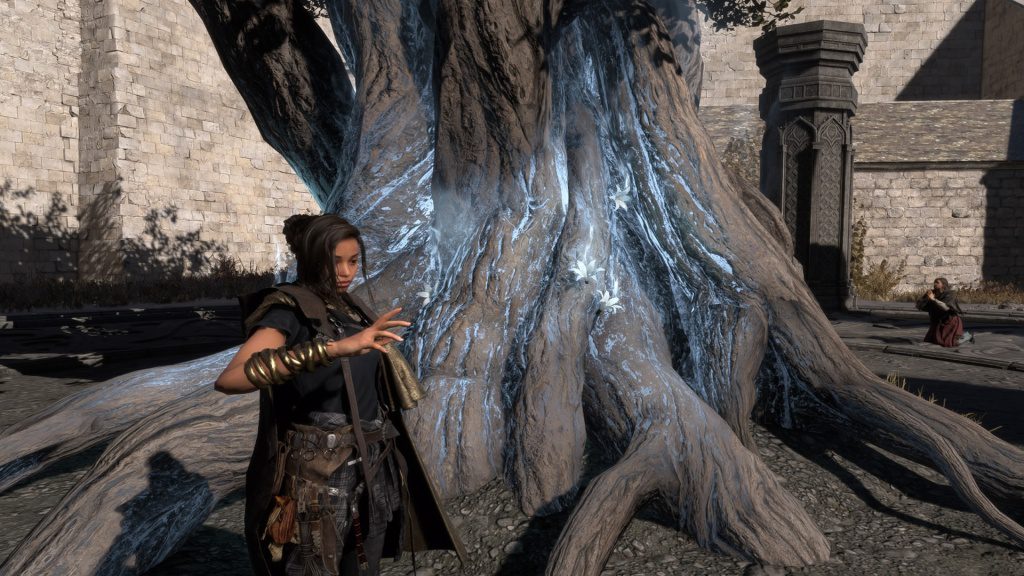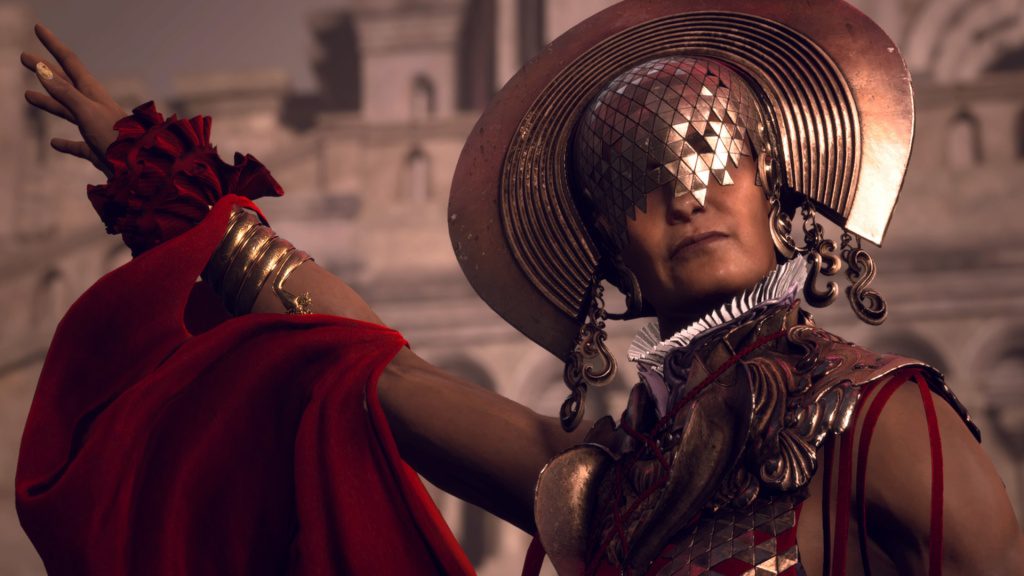Final Fantasy maker Square Enix and Final Fantasy XV team Luminous Productions set themselves a monstrous task with Forspoken. Releasing an open-world fantasy game in such a crowded landscape to players growing increasingly tired of these games’ endless task lists and vast worlds seems like folly. However, this isn’t just another big-budget game, even if its large world and combat may seem superficially reminiscent to recent hits like Horizon Forbidden West. It builds on its inspirations in subtle, clever ways, and while it may not have the deepest or most original story, Forspoken is a refreshingly personal tale that brings some welcome twists to the usual formula.
That said, Luminous seems determined to test the audience’s goodwill in Forspoken’s first chapter, peppering the introduction of protagonist, Frey, with tired tropes and unpleasant stereotypes.
Forspoken opens with Frey on trial for petty theft. A foster child in a broken system, she ends up entangled with an NYC street gang and has the threat of prison looming over her. Just when she contemplates stepping off a bridge, fate — or something like it — intervenes. Now she’s thrust into a strange, magical world wearing a smart-talking arm cuff called… Cuff, and being chased by a dragon.
So yes, a Japanese developer releases its first major western-leaning game starring a woman of color, and she’s instantly pegged is a criminal from a broken home. It’s tone deaf, through and through. By the time Frey ends up in Athia, it’s almost impossible not to sympathize with her and feel invested in her growth – growth made possible by her isolation and hardships in New York. But the narrative team could’ve established this connection in at least a half dozen other ways.
Captured on PlayStation 5
The situation changes once she arrives in Athia and bonds with Cuff, who’s a much pithier and more enjoyable companion than some of the game’s trailers might have first suggested. Forspoken is an Alice in Wonderland Story by design, and that’s not just metaphorically. Frey has a copy of Lewis Carrol’s classic tale in her apartment, and Chapter 2, where Frey accidentally steps into Athia, is even called “Down the Rabbit Hole.” Like Alice, Frey finds a world that’s not quite right. The laws of nature are seemingly turned upside down, and the Tantas, Athia’s four warrior rulers, now oppress their people and govern as violent dictators.
Athia might be tearing itself apart, but it certainly looks gorgeous on the PS5. I played on a 1440p monitor in quality mode and had the best of both worlds – sharp visuals and high framerate. Luminous makes brilliant use of light and particle effects that give Frey’s journey a sense of visual splendor, from the glowing purple rocks brimming with Athia’s magical life force to the gold dust effects that sprinkle and scatter when Frey uses her powers.
As for what Frey’s journey entails, the story continues following the Alice motif. A deadly fog Frey dubbed “The Break” engulfs Athia, scouring its landscape and driving all living things to madness. Frey, an outsider, is immune to its effects, not unlike Alice’s own immunity to Wonderland’s twisted logic – but she’s also a threat. Her presence causes the Tantas to go mad and wage war against their people. Frey decides to defeat the Tantas and restore peace, and the first Tanta she faces is even a violent, red-hued warrior queen, though she stops short of shouting “off with her head.”
The Alice similarities also stretch a bit further than Luminous might have intended. Like Carrol’s book, Forspoken is better at entertaining than it is at telling a deep story. Frey’s tale raises issues that are particularly relevant in the current social climate, namely prejudice, but it has nothing new or particularly insightful to say about them. If you’re after an original story or poignant commentary, you’ll probably be disappointed with Forspoken.
What kept me interested in both the main story and beyond was Forspoken’s detailed world building and thoughtful approach to design. The game draws inspiration from the likes of Horizon Zero Dawn and similar open-world epics, but there’s an important distinction. Where these games prioritize bulk, with dozens of new quests popping up every time you enter a new settlement, Forspoken prefers fewer, more meaningful quests, called Detours, that help Frey grow closer to Athia’s people and slowly find some emotional healing for herself as well. Frey may only help the people of Athia reluctantly at first, but she shows a sense of genuine interest that’s refreshing after so many detached, super heroic protagonists.

Captured on PlayStation 5
Even when the quests and characters themselves aren’t particularly deep (which they usually aren’t) there’s a current of humanity running through it all that makes the standard fetch quests and monster hunting feel more personal and interesting. One standout quest sees Frey run the length and height of a city, trying to help an old scholar – once revered and now losing his mind – find a simple item that helps him remember his family and who he used to be.
Athia itself certainly makes up for the depth its people may lack. Every item and location, even crafting materials, has a detailed archive entry explaining its significance and how it came to be. Such archive collections are hardly new themselves, and while Forspoken never reaches the levels of depth in something like BioWare’s Mass Effect, it treats its lore and world with a level of detail and interconnectedness that makes Athia feel lived in and believable. You might run across the coat a hero wore as they defended a refugee caravan from monsters, while just up the road is a group of undead husks animated by the Break – the refugees from that caravan who didn’t make it to safety in time.
Finding these little moments is less of a chore than it might seem, despite Athia’s massive size, as Forspoken’s world respects your time. One of Frey’s first magical parkour abilities lets her dash at high speeds, so even when your objective seems achingly far away on the map, it takes little time to reach it. Dashing around, flipping up cliffs and towers, and leapfrogging over enemies makes exploration a joy and even helps battles move at a rapid pace. Frey draws on her new magic powers to swing blades of fire and hurl giant stones at her foes while dancing around them and dodging attacks. You even get bonus experience and items if you fight with enough style.

Captured on PlayStation 5
Forspoken’s battle systems might not be anything new, but they are fun, remaining exhilarating whether you’re pursuing the main quest and hunting down the Tantas or exploring Athia’s secrets, uncovering its dark past in optional dungeons, and helping its few surviving people in your spare time.
Forspoken doesn’t have a “wow” factor – no innovative combat, thought-provoking story, or breathtaking world designs. Instead, it offers a more personal twist on the open-world formula, with thoughtful quests and a world whose size is less of a hindrance to enjoyment and more of a playground for Frey’s parkour abilities. While the storytelling may hit a few bumps along the way, Forspoken is a memorable tale and, as game worlds grow increasingly larger and full of busywork, a lesson in what matters more than size and scope.
Forspoken releases for PlayStation 5 on Jan. 24
